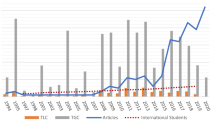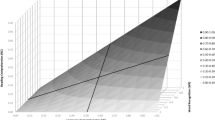Abstract
Research investigating whether people’s literacy skill is being affected by the use of text messaging language has produced largely positive results for children, but mixed results for adults. We asked 150 undergraduate university students in Western Canada and 86 in South Eastern Australia to supply naturalistic text messages and to complete nonword reading and spelling tasks. The Australian students also completed two further real word and nonword reading tasks, a spoonerisms task, a questionnaire regarding their reading history, and a nonverbal reasoning task. We found few significant correlations between literacy scores and both use of textisms (such as u for you) and measures of texting experience. Specifically, textism use was negatively correlated with spelling for the Canadian students, and with scores for timed nonword reading, spoonerisms, and Adult Reading History for the Australian students. Length of phone ownership was negatively correlated with spelling (Canadians), but positively correlated with Word Attack scores (Australians), whereas daily message sending volumes were negatively correlated with Word Attack scores (Australians). Australian students who thought that using textisms was more appropriate had poorer nonword reading and reported having had more difficulty learning to read, than those who found it less appropriate. We conclude that there is inconsistent evidence for negative relationships between adults’ use of textisms and their literacy skills, and that these associations may be influenced by attitudes towards the appropriateness of textism use. A model of the potential relationship between adults’ textism use and literacy skills is presented.

Similar content being viewed by others
References
Anis, J. (2007). Neography: Unconventional spelling in French SMS text messages. In B. Danet & S. C. Herring (Eds.), The multilingual internet: Language, culture, and communication online (pp. 87–115). New York, NY: Oxford University Press, Inc.
Baron, N. S., & Campbell, E. M. (2010, October). Talking takes too long: Gender and cultural patterns in mobile telephony. Paper presented at the conference of Association of Internet Researchers, Göteborg, Sweden. Retrieved from https://www.american.edu/cas/lfs/faculty-docs/upload/Talking-Takes-Too-Long.pdf.
Burt, J. S., & Long, J. (2011). Are word representations abstract or instance-based? Effects of spelling inconsistency in orthographic learning. Canadian Journal of Experimental Psychology, 65, 214–228. doi:10.1037/a0023708.
Coe, J. E. L., & Oakhill, J. V. (2011). ‘txtN is ez f u no h2 rd’: The relation between reading ability and text-messaging behaviour. Journal of Computer Assisted Learning, 27, 4–17. doi:10.1111/j.1365-2729.2010.00404.x.
Crystal, D. (2008). Txtng: The gr8 db8. Oxford, UK: Oxford University Press.
De Jonge, S., & Kemp, N. (2012). Text-message abbreviations and language skills in high school and university students. Journal of Research in Reading, 35, 49–68. doi:10.1111/j.1467-9817.2010.01466.x.
Deacon, S. H., Parrila, R., & Kirby, J. R. (2006). Processing of derived forms in high functioning dyslexics. Annals of Dyslexia, 56, 103–128.
Dixon, M., & Kaminska, Z. (1997). Is it misspelled or is it mispelled? The influence of fresh orthographic information on spelling. Reading and Writing an Interdisciplinary Journal, 9, 483–498. doi:10.1023/A:1007955314533.
Drouin, M. A. (2011). College students’ text messaging, use of textese and literacy skills. Journal of Computer Assisted Learning, 27, 67–75. doi:10.1111/j.1365-2729.2010.00399.x.
Drouin, M., & Davis, C. (2009). R u txting? Is the use of text speak hurting your literacy? Journal of Literacy Research, 41, 46–67. doi:10.1080/10862960802695131.
Drouin, M., & Driver, B. (2012). Texting, textese and literacy abilities: A naturalistic study. Journal of Research in Reading. doi:10.1111/j.1467-9817.2012.01532.x.
Elbro, C., Nielsen, I., & Petersen, D. K. (1994). Dyslexia in adults: Evidence for deficits in non-word reading and in the phonological representation of lexical items. Annals of Dyslexia, 44, 205–226.
Gallagher, A. M., Laxon, V., Armstrong, E., & Frith, U. (1996). Phonological difficulties in high-functioning dyslexics. Reading and Writing an Interdisciplinary Journal, 8, 499–509.
Grace, A., Kemp, N., Martin, F. H., & Parrila, R. (2012). Undergraduates’ use of text messaging language: Effects of country and collection method. Writing Systems Research, 4, 167–184. doi:10.1080/17586801.2012.712875.
Green, N. (2003). Outwardly mobile: Young people and mobile technologies. In J. E. Katz (Ed.), Machines that become us: The social context of personal communication technology (pp. 201–218). New Brunswick, NJ: Transaction Publishers.
Hatcher, J., & Snowling, M. (n.d.). York adult assessment. The University of York Centre for Reading and Language, York. Retrieved from www.york.ac.uk/media/psychology/crl/documents/YAA.pdf.
Herring, S. C., & Zelenkauskaite, A. (2009). Symbolic capital in a virtual heterosexual market: Abbreviation and insertion in Italian iTV SMS. Written Communication, 26, 5–31.
Humphrys, J. (2007, September). I h8 txt msgs: How texting is wrecking our language. Daily Mail. Retrieved from http://www.dailymail.co.uk/news/article-483511/I-h8-txtmsgs-How-texting-wrecking-language.html.
International Telecommunication Union. (2010). The World in 2010. Retrieved from www.itu.int/ITU-D/ict/.
Kemp, N. (2010). Texting vs. txting: Reading and writing text messages, and links with other linguistic skills. Writing Systems Research, 2, 53–71. doi:10.1093/wsr/wsq002.
Kemp, N., & Bushnell, C. (2011). Children’s text messaging: Abbreviations, input methods and links with literacy. Journal of Computer Assisted Learning, 27, 18–27. doi:10.1111/j.1365-2729.2010.00400.x.
Kemp, N., Parrila, R., & Kirby, J. (2008). Phonological and orthographic spelling in high-functioning adult dyslexics. Dyslexia, 15, 105–128.
Lewandowski, G., & Harrington, S. (2006). The influence of phonetic abbreviations on evaluation of student performance. Current Research in Social Psychology, 11, 215–226.
Lewis, C., & Fabos, B. (2005). Instant messaging, literacies, and social identities. Reading Research Quarterly, 40, 470–501. doi:10.1598/RRQ.40.4.5.
Martin, F., & Pratt, C. (2001). Nonword reading test. Melbourne, Australia: Australian Council for Educational Research, Ltd.
Massengill Shaw, D., Carlson, C., & Waxman, M. (2007). An exploratory investigation into the relationship between text messaging and spelling. New England Reading Association Journal, 43, 57–62.
Neville, L. (2003). Cn U rEd dis? The causes and consequences of a ‘text message language’ in young teenagers (unpublished undergraduate dissertation). Oxford, UK: University of Oxford.
Parrila, R., Corkett, J., Kirby, J. R., & Hein, S. (2003). Adult reading history questionnaire—revised (unpublished questionnaire). Canada: University of Alberta.
Plester, B., & Wood, C. (2009). Exploring relationships between traditional and new media literacies: British preteen texters at school. Journal of Computer Mediated Communication, 14, 1108–1129. doi:10.1111/j.1083-6101.2009.01483.x.
Plester, B., Wood, C., & Bell, V. (2008). Txt msg n school literacy: Does texting and knowledge of text abbreviations adversely affect children’s literacy attainment? Literacy, 42, 137–144. doi:10.1111/j.1741-4369.2008.00489.
Plester, B., Wood, C., & Joshi, P. (2009). Exploring the relationship between children’s knowledge of text message abbreviations and school literacy outcomes. British Journal of Developmental Psychology, 27, 145–161. doi:10.1348/026151008X320507.
Powell, D., & Dixon, M. (2011). Does SMS text messaging help or harm adults’ knowledge of standard spelling? Journal of Computer Assisted Learning, 27, 58–66. doi:10.1111/j.1365-2729.2010.00403.x.
Rosen, L. D., Chang, J., Erwin, L., Carrier, L. M., & Cheever, N. A. (2010). The relationship between “textisms” and formal and informal writing among young adults. Communication Research, 37, 420–440. doi:10.1177/0093650210362465.
Shortis, T. (2007). Gr8 txtpectations: The creativity of text spelling. English Drama Media Journal, 8, 21–26.
Tagliamonte, S. A., & Denis, D. (2008). Linguistic ruin? Lol! Instant messaging and teen language. American Speech, 8, 33–34.
Thurlow, C. (2006). From statistical panic to moral panic: The metadiscursive construction and popular exaggeration of new media language in the print media. Journal of Computer Mediated Communication, 11, 667–701. doi:10.1111/j.1083-6101.2006.00031.x.
Thurlow, C., & Brown, A. (2003). Generation txt? The sociolinguistics of young people’s text-messaging. Discourse Analysis Online. Retrieved from http://extra.shu.ac.uk/daol/articles/v1/n1/a3/thurlow2002003.html.
Tossell, C. C., Kortum, P., Shepard, C., Barg-Walkow, L. H., Rahmati, A., & Zhong, L. (2012). A longitudinal study of emoticon use in text messaging from smartphones. Computers in Human Behavior, 28, 659–663. doi:10.1016/j.chb.2011.11.012.
Tseliga, T. (2007). “It’s all Greeklish to me!” Linguistic and sociocultural perspectives on Roman-alphabeted Greek in asynchronous computer-mediated communication. In B. Danet & S. C. Herring (Eds.), The multilingual internet: Language, culture, and communication online (pp. 116–141). New York, NY: Oxford University Press, Inc.
Varnhagen, C. K., McFall, G. P., Pugh, N., Routledge, L., Sumida-MacDonald, H., & Kwong, T. E. (2009). Lol: New language and spelling in instant messaging. Reading and Writing, 23, 719–733. doi:10.1007/s11145-009-9181-y.
Wechsler, D. (2008). Wechsler adult intelligence scale-fourth edition (WAIS-IV). San Antonio, TX: The Psychological Corporation.
Wilkinson, G. S., & Robertson, G. J. (2006). Wide range achievement test (4th ed.) (WRAT-4). Lutz, FL: Psychological Assessment Resources.
Wood, C., Jackson, E., Hart, L., Plester, B., & Wilde, L. (2011a). The effect of text messaging on 9- and 10-year-old children’s reading, spelling and phonological processing skills. Journal of Computer Assisted Learning, 27, 28–36. doi:10.1111/j.1365-2729.2010.00398.x.
Wood, C., Meachem, S., Bowyer, S., Jackson, E., Tarczynski-Bowles, M. L., & Plester, P. (2011b). A longitudinal study of children’s text messaging and literacy development. British Journal of Psychology, 102, 431–442. doi:10.1111/j.2044-8295.2010.02002.x.
Woodcock, R. (1999). Woodcock reading mastery tests—revised/normative update. Circle Pines, MN: American Guidance Service, Inc.
Woronoff, P. (2007, December). Cell phone texting can endanger spelling. Retrieved from http://www.articlesbase.com/cell-phones-articles/cell-phone-texting-can-endanger-spelling-276413.html.
Acknowledgments
We would like to thank Krystle-Lee Turgeon and Imogen Svoboda for their help with this research. Financial assistance was provided to the first author in the form of an Elite Ph.D., Scholarship from the University of Tasmania and an Australian Postgraduate Award from the Australian Government.
Author information
Authors and Affiliations
Corresponding author
Rights and permissions
About this article
Cite this article
Grace, A., Kemp, N., Martin, F.H. et al. Undergraduates’ text messaging language and literacy skills. Read Writ 27, 855–873 (2014). https://doi.org/10.1007/s11145-013-9471-2
Published:
Issue Date:
DOI: https://doi.org/10.1007/s11145-013-9471-2




